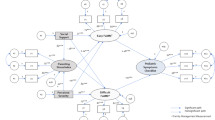Abstract
The relationship between family functioning, social support, and medication compliance in 32 renal transplant children and their parents was examined. Results indicated that children whose fathers gave more emotional support or were more informative were less compliant with azathioprine and cyclosporine (P<0.05 for both). Children from families experiencing numerous stresses were also found to be less compliant with azathioprine (P<0.05). Finally, compared with older children, younger children were found to be less compliant with cyclosporine (P<0.005). Implications for predicting child adherence and for future research relating to compliance with multidrug regimens are discussed.
Similar content being viewed by others
References
Beck DD, Fennell RS, Yost RL, Robinson JD, Geary MB, Richard GA (1980) Evaluation of an educational program on compliance with medication regimens in pediatric patients with renal transplants. J Pediatr 96: 1094–1097
Korsch BM, Fine RN, Grushkin CM, Negrete VF (1971) Experiences with children and their families during extended hemodialysis and kidney transplantation. Pediatr Clin North Am 18: 625–637
Cohen S, Syme S (1985) Social support and health. Academic Press, New York
Levy R (1983) Social support and compliance: a selective review and critique of treatment integrity and outcome measurement. Soc Sci Med 17: 1329–1338
Sweeney J, Von Bulow B, Shear K, Friedman J, Plowe C (1984) Compliance and outcome of patients accompanied by relatives to evaluations. Hosp Community Psychiatry 35: 1037–1038
Korsch BM, Fine RN, Francis-Negrete V (1978) Noncompliance in children with renal transplants. Pediatrics 61: 872–876
McCubbin H, McCubbin M, Patterson J, Cauble A, Wilson L, Warwick W (1983) CHIP-coping health inventory for parents: an assessment of parental coping patterns in the care of the chronically ill child. J Marriage Fam 45: 59–370
Sargent J (1983) The sick child: family complications. Dev Behav Pediatrics 4: 50–56
Barrera M, Sandler I, Ramsay T (1981) Preliminary development of a scale of social support: studies on college students. Am J Community Psychol 9: 435–447
Ferrari M (1986) Perceptions of social support by parents of chronically ill children versus healthy children. Child Health Care 15: 26–31
Olson D, Portner J, Lavee Y (1985) FACES III: family adaptability and cohesion evaluation scales. In: Olson DH, McCubbin HI, Barnes H, Larsen A, Muxen M, Wilson L (eds) Family inventories: inventories used in a national survey of families across the family life cycle: 143–159 Family Social Science, University of Minnesota St. Paul
McCubbin H, Patterson J, Wilson L (1985) FILE: family inventory of life events and changes. In: Olson DH, McCubbin HI, Barnes A, Larsen M, Muxen M, Wilson L (eds) Family inventories: inventories used in a national survey of families across the family life cycle: 143–159. Family Social Science, University of Minnesota St. Paul
Cohen J, Cohen P (1983) Applied multiple regression/correlation analysis for the behavior science, 2nd edn. Lawrence Erlbaum, Hillsdale
Pidgeon V (1989) Complicance of chronic illness regimens: schoolaged children and adolescents. J Pediatr Nurs 4: 36–47
Etzwiller D, Sines L (1962) Juvenile diabetes and its management: family, social, and academic implications. JAMA 181: 304–308
Alessandri S, Wozniak R (1987) The child's awareness of parental beliefs concerning the child: a developmental study. Child Dev 58: 361–323
Epstein L, Cluss P (1982) A behavioral medicine perspective on adherence to long-term medical regimens. J Consult Clin Psychol 50: 950–971
Simonds JF (1979) Emotions and complicance in diabetic children. Psychosomatics 20: 544–551
Author information
Authors and Affiliations
Rights and permissions
About this article
Cite this article
Foulkes, LM., Boggs, S.R., Fennell, R.S. et al. Social support, family variables, and complicance in renal transplant children. Pediatr Nephrol 7, 185–188 (1993). https://doi.org/10.1007/BF00864393
Received:
Revised:
Accepted:
Issue Date:
DOI: https://doi.org/10.1007/BF00864393




